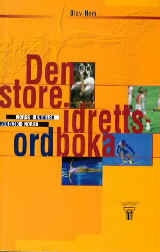|
| |
Comprehensive Sports Dictionary
|
 |
| Misprints |
Norwegian-English/English-Norwegian Dictionary for Winter Sports
was first published by a small local company in September 1995. In 1996, the
rights as well as the responsibilty for the marketing of the book were taken
over by Universitetsforlaget (Scandinavian University Press).
This dictionary is a continuation of that work. With most of the summer- and
winter-sports activities incorporated, it may be assumed to be the first and
only bilingual dictionary within this field in Scandinavia. The book now
contains some 20.000 entry words. An important addition is the great number of
examples of their use, which in the majority of cases have been excerpted from
British and American-English media sources, and afterwards rendered into
Norwegian. The language in these extracts is partly characterised by this
British and American blend. To a certain extent I have paid attention to this in
the entry words, indicating what is American-English as compared with
British-English. However, the examples taken from American sources have not been
altered to fit in with British-English usage.
Entry words and phrases are not linked with the vocabulary of sports in a
restricted sense only. Modern sports have a wide scope of supplementary
activities, among which may be mentioned arrangements, rules and regulations,
training activities, anatomy and physiology, sports injuries and the doping
problem. These fields are also well covered in this dictionary.
On this background, this dictionary should be a valuable source of information
to all those who are involved and interested in sports in general, or within a
special branch of it. It is to be hoped that an involvement in sports may be
linked with a wish to learn more about foreign languages – in this case
English. Therefore the book contains words and phrases which are not at first
sight associated with the language of sports, in order to make it possible for
the user to link the special vocabulary with more general expressions.
In the process of compilation of this dictionary, I have benefited by the
guidance and help of the experienced lexicographer and close friend, Willy
Kirkeby, contributed when the dictionary on winter sports was worked out.
Therefore, I should also in this connection like to express my thankfulness to
him. My wife, Gunvor, has all through the process been a valuable consultant and
conscientious proofreader. Her critical and constructive comments, both factual
and in connection with my Norwegian renderings, are especially appreciated.
Last but not least, thanks to friends in England, who have been very useful
contacts, especially Ann & Roy Richards and Joan & Geoffrey Owen. With
her professional competence of the English language (BA), Mrs Ann Richards has
particularly been of invaluable support, and I feel that the manuscript has been
through a quality screening thanks to her proofreading and positive assessment.
Hamar, March 1998
Olav Hem
MISPRINTS
The observant user of the dictionary will most likely be astonished to find the
misprints that occur, and which may be interpreted as quite queer.
The manuscript was, after very conscientiuos proof-reading, sent over to
Universitetsforlaget (the publishing company) on cassets worked out in W.P. 5.1
system.
Also relevant people in the publishing company did their share of the
proof-reading, and they reported back that they had found surprisingly few
misprints.
They chose to convert W.P. 5.1 to 'Word' before the manuscript was forwarded to
the printing press.
When the book was finally published, I was after a while surprised to find so
many irregularities that I contacted the people who were responsible for the
product at Universitetsforlaget. They were also surprised and concerned about my
findings.
On closer examination it was found out that the cause was of technical character.
During the conversion process the machine had met problems with the Norwegian
letters 'ø' (=oe) and 'å', and some accent symbols.
The publishing company took upon themselves the entire blame for what had
occurred in the final stages of the process.
I feel nevertheless that it is deplorable, and that it somehow reduces the
quality of the dictionary. I hope that those of you who have been vexed by the
blunders, will be a little milder in your critical remarks after you have read
this explanation.
Hamar, des. 2000
Olav Hem |